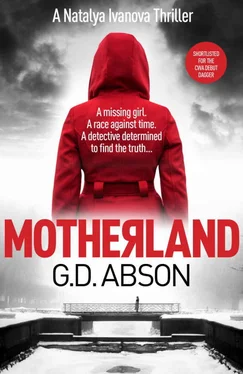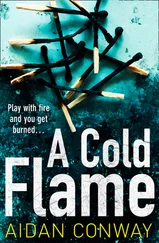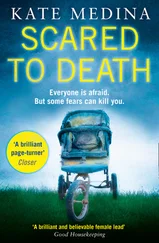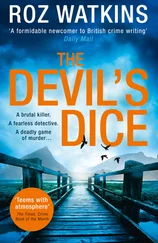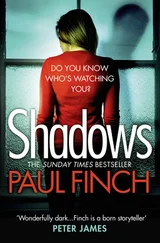The taste was random and inexpensive, a pre-furnished student apartment, which came as a surprise considering the funds Zena must have at her disposal. Natalya placed the matryoshka doll she had bought from the old woman on a telephone table and sniffed the air. She was glad there were none of the fruity notes of esters that marked the early decomposition stage of a corpse, but nor were there the lingering traces of perfume, cooked food, or artificial fresheners that came with the living.
There were two doors to the right, which she supposed led to the sole bedroom and the bathroom, and an archway on the far side leading to the kitchen. In the living room, next to the sofa-bed, were two empty Heineken bottles resting on a 1970s style smoked-glass table. She picked up each bottle in turn and held them up to a sliver of light to see traces of lipstick on the mouths, reddy-brown on one and pink on the other. There was a small bookcase by the television with titles on International Law and Politics, mainly in Russian; they looked untouched.
Zena’s kitchen was pristine compared to her own. She opened the fridge by the door’s edge seeing white boxes holding the remnants of a takeaway with the stamp of a Korean restaurant; adjacent to it was a bag of wilting salad leaves. A milk carton had a day left on its ‘consume by’ stamp. She closed the door and examined a picture postcard fixed by a fridge magnet of Saint Isaac’s Cathedral. The card was an old photograph of a man in folk dress standing in a kayak; stylised writing along the bottom edge gave the location away as Östergötland. A few hand-written lines in Swedish were signed off with “Papa” followed by a cross for a kiss. It was dated April. She replaced the card and inspected the rest of the kitchen but it held little interest: a worn but spotless four-ring gas stove; a washer-dryer full of clothes.
A wall calendar of Swedish countryside scenes was pinned to the archway that led back to the living room; it was the type of present an unimaginative parent or grandparent might buy. Taking out her iPhone, she held up the pages and took photographs of any that held appointments. In February, Zena had logged a visit to a dentist; in April, a doctor; both words were written in Russian with no names or addresses – that was a shame. She returned the calendar to the current month, then took a picture of the neat handwriting in the square for Tuesday the 6th of June: “9:30 ZAGS”.
Everyone in the country had been to a Zapis Aktov Grazhdanskogo Sostoyaniya, or ZAGS for short, at some point in their lives, it was the civil registration office where births, marriages, divorces and deaths were recorded. They also performed ceremonies. On the 12th of July 2014, she had gone to the one on Furshtatskaya Ulitsa to marry Mikhail at Wedding Palace Number Two. For a girl of nineteen, it was unlikely Zena had gone there for herself.
The bedroom was behind the first of two closed doors, where an ethnic Indian-print quilt covered a neatly made bed. Next to it was an old wood-veneer wardrobe. She pulled on the handles to find it full of clothes. One hanger supported a beautiful rose-coloured dress with tassels; the label displayed “Monique Lhuillier”. She flicked through some of the others, finding the names of Brunello Cucinelli, Max Gengos and a few designers she didn’t recognise. Below them, an apartment block of shoeboxes held Manolo Blahniks, Jimmy Choos, Valentinos, and a stunning pair of Michael Kors flats. Zena may have shunned a luxurious apartment but the girl had managed to bring a few essentials with her. Natalya stopped when she realised the clothes were becoming a distraction, noting only that there were no obvious signs of burglary since the contents of the wardrobe were worth at least twice her annual salary.
Resting on the bedside table was a pair of gold hair straighteners. She tapped one of the ceramic heating elements – it was cold to the touch. She pulled open the table’s single drawer. Inside was a phone charger and a paperback in Swedish which she lifted gingerly to reveal a pink foil pack of birth control pills.
Her phone started buzzing and she saw Rogov’s name on the screen. The Sergeant had been Mikhail’s best man at his first wedding and seemed to believe his continuing friendship with her husband gave him the right to be overly familiar with her. Normally she welcomed friends of Mikhail, but in her view Rogov epitomised the worst type of policeman; his chauvinism ran as deep as the Volga and the tactics he used to extract confessions made her ashamed to work in the same department. She tried to keep Rogov at a distance and reprimanded him regularly, but he brushed each one away as if she had made an elaborate joke he didn’t fully understand.
The phone stopped while she was removing her gloves to avoid cross-contamination. She tapped the screen to return the sergeant’s call.
‘Rogov?’
‘Hey boss, are you in the apartment yet? Misha said you were going to check out the place.’
‘Yes, I got the keys from her neighbour. Next time, speak to me. Don’t go through him.’
‘Sorry, boss.’
‘What did the duty sergeant from Vasilyevsky tell you about the girl who reported Zena missing?’
‘Not much – he said she looked like a supermodel.’
‘I’ll rephrase that. Did he say anything useful?’
‘He said she’d tried calling Dahl’s phone but it was going to voicemail. Her name is Yulia, no surname offered… from what I heard she was more nervous than a rabbit in a wolf pack. At first he thought it was a joke: a teenager forgets to use social media for a day so it must be an emergency.’
‘Until she told him Zena was a rich kid.’
‘Yeah.’
She looked at the birth control pills again and observed tiny letters on the blister pack marking the menstrual cycle; they were abbreviations for the days of the week in English. Zena’s last pill had been taken on a Thursday. Presumably the day she had gone missing unless the pack was old.
‘Does she have any type of transport… a car or motorbike?’
Sergeant Rogov let out a yawn. ‘No idea.’
‘Well, locate Zena’s parents and find out what you can. She may have told them her plans or gone home for the weekend.’
There was a brooding silence. ‘Are they Svens?’
‘Probably.’ Then she realised. ‘You don’t speak English or Swedish, do you, Rogov?’
‘Didn’t realise I had to.’
‘Well, as you’re being so friendly with Misha, can you ask him to do it?’ She hid her relief that Rogov wouldn’t be interacting directly with Zena’s parents.
She kept the phone to her ear and crouched down, careful to keep her shoes and the knees of her jeans away from Zena’s fraying Persian rug. Even if the worst had happened, it was unlikely any fibre analysis would be conducted – the facilities existed but they were only used in the most serious cases; and that usually meant a political dimension. Underneath the bed she found a full set of green, vintage-style suitcases.
‘Her luggage is here.’
‘Not looking good for the Sven, then.’
‘No,’ she agreed. It wasn’t looking good for Zena but there were still plenty of possibilities to explain a university student spending two nights away from home.
She heard a muffled sound on the phone, then, ‘Boss?’
‘Wait, Rogov.’
There was one room left to try and she turned the handle with the tip of her index finger. Inside the bathroom was a tub with a detachable shower hose; nearby, a small toilet and sink in white porcelain looked at least fifty years old by the style and loss of enamel. She pulled off a square of toilet paper and dabbed it against the bristles of an electric toothbrush; the tissue came away dry. There were bottles of contact lens solution and an opened lens case. Inside a cupboard she found the same type of medicines that accumulated in her own home: a near-empty bottle of cough syrup, paracetamol and a packet of antihistamines – nothing unusual.
Читать дальше
